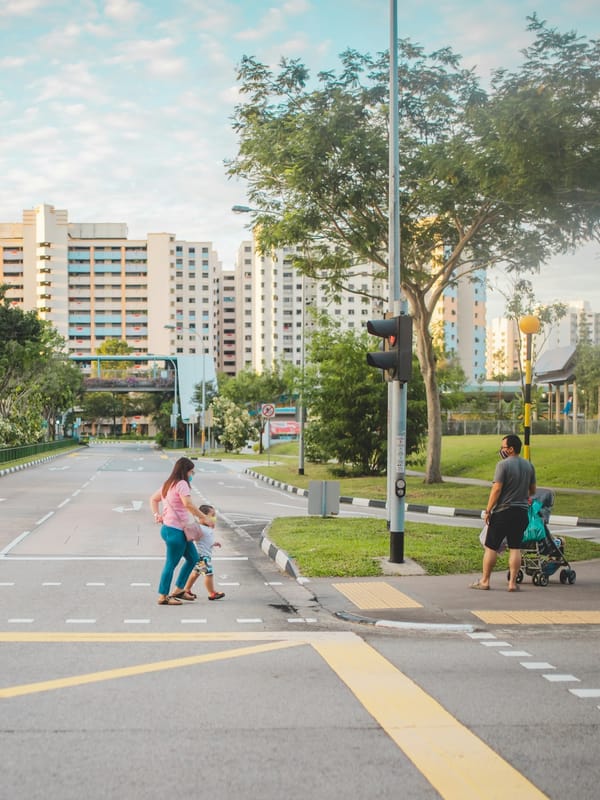What does it take to raise a child? Or children.
More than a village.

There are many articles and posts online about how much it costs to raise a child in Singapore. And the numbers can be quite staggering, especially when they include things like private doctors, cars, domestic helpers, private childcare, private tuition, enrichment classes, holidays, moving house for primary school (I can't believe this is actually a thing), overseas education, housing downpayment, and what have you. I have seen numbers in the north of half a million dollars cumulatively until the child turns 21; people are afraid of not "giving their child the best possible life".
And that is for a single child, mind you.
Looking solely from a financial angle, children are liabilities; there is no other way around it. Your children are not your retirement plan. At best, something has got to go – your money, your time, your career, your health, your social life, something.
But here is the thing. Counting the change always means you cannot have everything – children or no children. Have you read of the businessman in Little Prince? He's too busy counting the stars he claims he owns (for the sake of "owning" it) to be bothered with anything else.
Elephant in the room
Throwing money at families is not going to make people want to have more children. It helps, I won't deny it. And there have been steps in the right direction. For instance, child care subsidies for lower-income families regardless of whether the mother is working or not.
But what's the common thread? Everything is viewed from a financial angle. I get it, these policies were formulated during a different time. And don't even get me started on the bureaucracies involved in getting these financial support. The point is, they need to evolve to meet the needs of the current time.
There are so many non-financial support that are needed. For instance, public facilities should be more child-friendly. MRT stations with diaper changing rooms and nursing facilities (then maybe car ownership won't become a default "need" when couples have kids).
Public libraries with children rooms and nursing facilities. Parks with these children facilities too (not just play area... where are they going to clean up and rest after that??). To be fair, newer estates have decent playgrounds.
Stroller-friendly buses and walkways (thankfully at least ramps are a by-product of infrastructure enhancements to support an ageing population – if we can do this for the elderly, why not for kids? I know children don't vote, but their parents do, and they will grow up to be voters too).
Coffee shops and hawker centres with child seats and diaper changing stations (don't get me started, we even need to give grants to keep toilets clean...). The only places to easily find nursing and childcare facilities (albeit mostly barebones) are in commercial spaces like malls and attractions (and these are arguably tied to attracting visitors and hence, once again, money).
Workplaces which understand the needs of families (not just lip-service). People looking out for children around them, instead of judging children (and their parents or helpers) throwing tantrums in public.
Accessible child care services; and by accessible I don't only mean affordable – proximity, convenience, and quality (real or perceived) matter a lot too. The belief that there is more to life than academic and, ultimately, financial achievements. We need bolder and bigger steps in this aspect.
You may argue these also incur financial costs. But perhaps the financial resources can be better put to use, instead of just throwing money (a.k.a. "more support") at families. Families cannot use directly use their "baby bonus" to achieve these "public goods". More importantly, different signals are produced: one shouts "here is some money, but you are on your own otherwise", the other whispers "we love children, we will support you in raising them, and we are here for you".
So what is it then?
Unlike money, love, when shared, does not diminish; it grows. Getting married is one thing (you can still lead somewhat independent lives), but having children is a whole other thing. Your children will need your presence, your time, your attention, your love; not just your money (once again, I am not saying you don't need money at all to raise children, I just don't think you actually need that much).
How do you provide for someone who demands so much, but can give so little, and yet so vulnerable? It calls for total self-sacrifice and unconditional love. Maybe something does have to go after all: our self-centredness. Perhaps, this, is what people are actually afraid of.
How do we get there?
You might have heard: it takes a village to a raise a child. To many, "a village" means their immediate family. But no; it is literally a village, and perhaps more. It's not just your immediate family – it's your extended family, your grandparents, your cousins, your neighbours, your friends, your neighbours' and friends' children, your community, your colleagues, your bosses, your subordinates, your food stall vendors, your delivery workers, your cleaner aunties and uncles, your taxi uncles, the strangers you meet on the street, and, in fact, the entire society.
Be that village to your friends, to their children, to your neighbours, to your children's teachers, to the kids you see running around in the playground, to your co-workers, to strangers you meet in the bus, to the families on the train.
I would argue it also transcends time, not just space, since your experience growing up (past) will shape your experience as a parent (present) and affect others' perceptions, which will then affect you and your children eventually (future).
So maybe there is a way for us to have everything; and it starts with acknowledging the transcendence involved in raising children. Pro-creation is nothing short of a miracle; it is indeed a participation of the divine act of creation.
Let me close this article by sharing this Nuptial Blessing, commonly said for newly-wed couples at the wedding Mass. I think it suffices to reproduce the start and the end of the prayer below (emphasis mine), which beautifully encapsulate the origin and eschatological purpose of marriage – and, in fact, of humanity.
O God, who by your mighty power
created all things out of nothing,
and, when you had set in place
the beginnings of the universe,
formed man and woman in your own image,
making the woman an inseparable helpmate to the man,
that they might be no longer two, but one flesh,
and taught that what you were pleased to make one
must never be divided;
...
And now, Lord, we implore you:
may these your servants
hold fast to the faith and keep your commandments;
made one in the flesh,
may they be blameless in all they do;
and with the strength that comes from the Gospel,
may they bear true witness to Christ before all;
may they be blessed with children,
and prove themselves virtuous parents,
who live to see their children’s children.
And grant that,
reaching at last together the fullness of years
for which they hope,
they may come to the life of the blessed
in the Kingdom of Heaven.
Instead of a summary, I will let you ponder on the prayer above. Support Pondering Potato by using the referral links in the posts, sharing on Telegram, subscribing, or donating.




